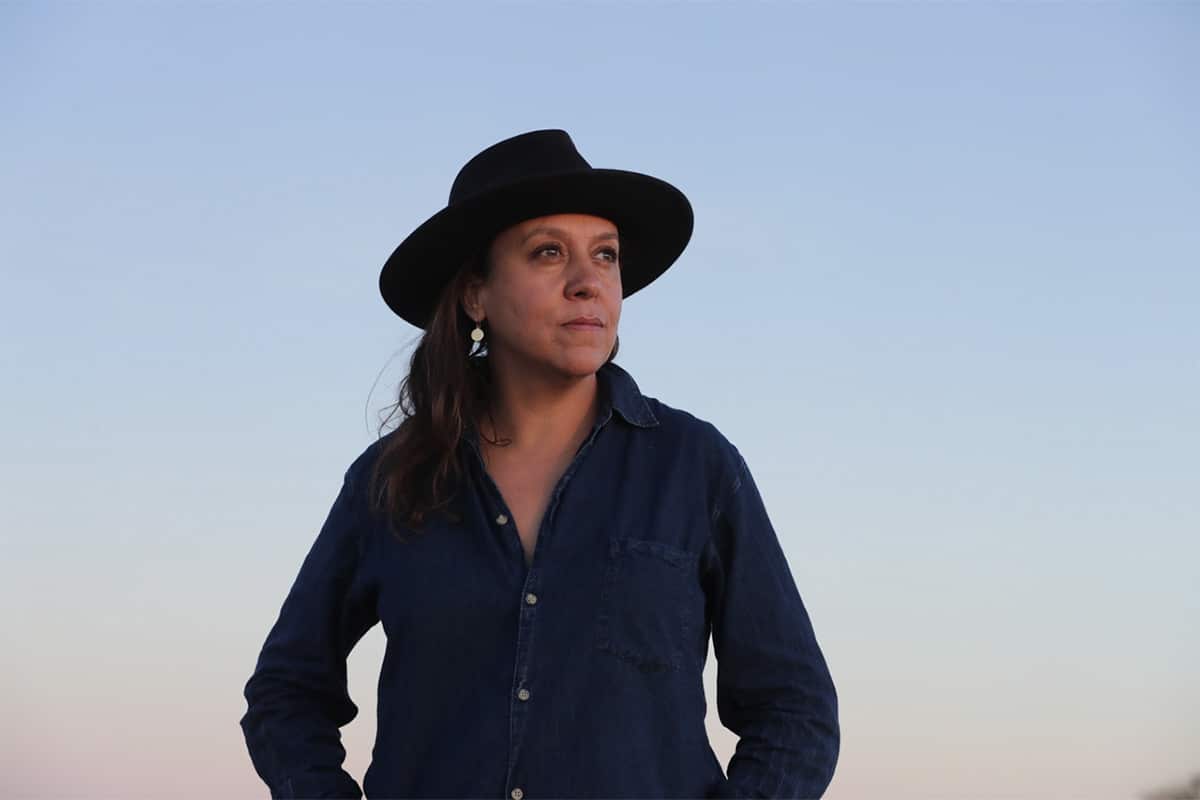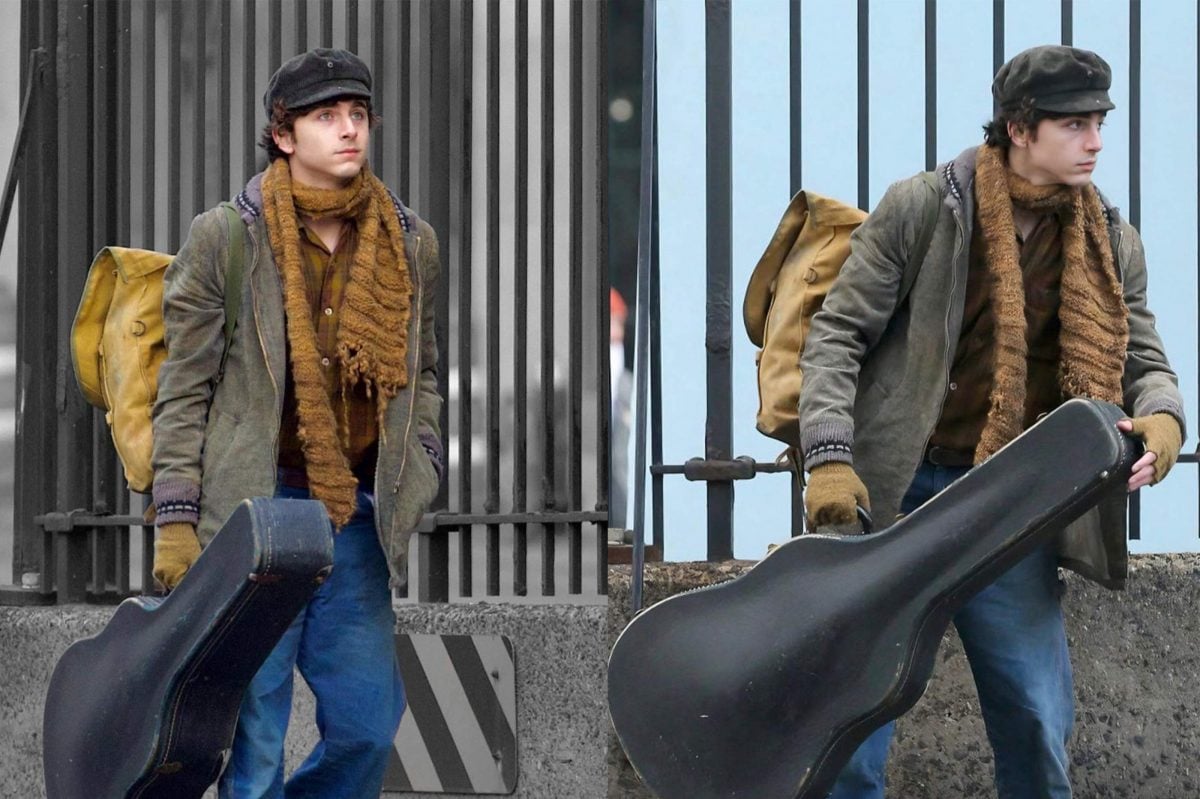
This year, Rachel Perkins stepped out from behind her filmmaker's lens to stand in front of the camera as co-chair of the Yes Campaign. Like so many First Nations people, the fight for constitutional recognition is one the Arrernte and Kalkadoon woman has inherited, passed down by her father, the civil rights activist Dr. Charles Perkins. It's been a tough campaign so far. Perkins describes the lead up to the Voice to Parliament referendum as the "greatest example of the twisting of words I think our country has seen in a very, very long time". But despite the lies and misinformation, she remains hopeful.
Days out from when Australians across the country are set to take to the polls to cast their vote, RUSSH spoke to Perkins, who is at home in Mparntwe/Alice Springs. Find our conversation, below.
It's a loaded question but how are you feeling right now?
Oh, it is a loaded question. Look, yesterday, we had the most amazing gathering led by Aboriginal women from the community in Alice Springs. It was just so brilliant. We had 10 different women speak – senior women, young women, from all different organisations – and then Noel Pearson spoke as well. We organised it literally 24 hours before and hundreds and hundreds of people filled the local mall here in Alice Springs. And – can I just say, while the senior women of this community, the cultural and political leaders of this community were all united at one end of the mall, at the same time, the woman who has led the No campaign was pretty much alone with her husband at the other end of the mall handing out leaflets.
So whatever happens, that was an amazing moment for my community, being with all those women was incredible. So on a bit of a high from that, but conscious of the impending national vote. We're staying hopeful and doing everything we can, really, to get the word out that this comes from our people. It's what we want.
What are the next few days looking like for you in the lead up to the Voice Referendum on Saturday?
At the moment I'm in Alice Springs. I may or may not be getting on a plane in an hour to get to the East Coast. There's a possible press conference in Canberra, the last one on Friday. Then I'll probably get on a plane back to Alice Springs to be home and cast my vote. Paul Kelly is playing a concert in Alice on Saturday. So I'll cast my vote, go to the concert, and sit around the campfire while the results come in.
Your father was a leading light in the Yes Campaign for the 1967 Referendum. Has he been in your thoughts during this time?
He has been. The night before last, we were in Adelaide with Troy Cassar-Daley and Paul Kelly and held a free concert, trying to create a conversation around the referendum. Of course, people keep asking what happens if it's a 'No', and I keep avoiding that question because I don't want to depress people and talk about how broken we will be. So I tell people: "I'm not answering that question because we're focused on 'Yes'". Which we are, but people still want that answer.
Anyway, Paul Kelly recited It by the famous, racist but great, poet Rudyard Kipling at the concert. Well, it was my dad's favourite poem and it was very true to his work. Especially the following lines:
If you can bear to hear the truth you’ve spoken
Twisted by knaves to make a trap for fools,
Or watch the things you gave your life to, broken,
And stoop and build ’em up with worn-out tools.
I absolutely felt that. Because dad helped build three of the previous five advisory committees and they've been shut down over my lifetime, right? Now for me to contemplate what a loss might mean, which is what the current polls are saying, and then bend down to try again, you know, I really understand what strength he had to keep doing that. Because I can understand how you would give up hope and stop trying, but he kept bending down and picking up those broken tools, trying to keep faith, rebuild, and work with government to advance the cause of our people.
So, I now understand the full meaning of that poem and why it meant so much to him.
It really speaks to the persistence to continue even after great loss...
Yes, and having all your faith smashed to pieces. I think that line about having your words twisted really resonates too. This is the greatest example of the twisting of words I think our country has seen in a very, very long time. The fact that we're trying to unify the country and people are saying we're being divisive. Our words are being twisted against us and the Australian people are being fooled with misinformation. There have been so many lies during a time that could be such a great unifying moment for this country.
What are your earliest memories of campaigning and protesting with your father?
Just, you know, being at home getting bits of cardboard and working out what to write on a placard pretty much from the moment we could write. Back then you couldn't get an Aboriginal flag t-shirt, we had to make our own, so drawing Aboriginal flags on our t-shirts in texta as well.
Dad would always be way up the front of a demo, and the kids would be in the middle of it somewhere, and we'd eventually find him. He was always at the front with a megaphone. I've actually had to MC a few rallies – I MCd the Sydney one – and someone handed me the megaphone and I was like "what do I do with this". But then I really got the hang of it and suddenly I loved the megaphone. It was funny transitioning into a spokesperson role – usually I'm filming the spokespeople and this time I'm one of them.
How have you felt about this transition?
It's not something I'm necessarily comfortable with, I don't love being in front of the camera. I will stop this as of Saturday October 14 – you will not see me again in the media at all. Obviously I get a lot of horrible stuff on social media but that doesn't worry me actually. What's been wonderful is that whenever I go to a polling booth or supermarket, I find I'm sort of a place where people can come to and express their excitement and sincerity and feelings, and that is a great privilege, just meeting ordinary Australians who are volunteering or just care about the Yes Campaign, and how much they've encouraged me to keep going. That has been a beautiful experience, meeting people I would've never met before and having these rather intense, passionate, fleeting conversations.
You would be absorbing a lot of people's emotions and opinions in this role. There is just so much misinformation and hateful rhetoric going around right now. How are you fortifying yourself and do you have any advice on how other First Nations people can care for themselves right now?
I'm very lucky because I have a very strong family, and my family has weathered all sorts of political campaigns. So they understand that everything needs to be prioritised around the campaign.
That's why I'm coming back to Alice Spring after the vote, and I'm just going to sit here for a while in my community and think about the future. For the first time I don't have a film project to go onto, I've given my time entirely to the campaign really intensely. So I've got to work out what I do next because actually, I don't know what the future holds for myself for the first time in a long time.
But on how to take care of yourself, one of the things that Shane Phillips from Redfern said in passing to a group of people was, "whatever the result is, there is a huge proportion of millions of Australians who support this". That's a really good way to think about it, and that's goodwill we can build on in the future.
What would you say to people who are hesitant to Vote Yes because of the case put forward by the Blak Sovereign Movement?
I can understand that they want more. I appreciate that – I want more too. However, this is a major step forward and I would say don't make perfect the enemy of good. Constitutional recognition is a very different mechanism from treaty. Treaties take – we've seen in Victoria, it's taken five years just to set up the assembly, right? – a treaty at the federal level is going to take at least 10 years, and it's going to have an even more concerted 'No Campaign' fight. This referendum can be done and dusted in two days. And it doesn't take away from the treaty process, it's actually just a different mechanism. The Voice can exist side by side of treaty process, if that's what people want. So, it's just another step forward; it doesn't undermine, it's not a binary thing, you can have both.
Is there one last thing you'd like to say to people before they head to the polling booths on Saturday?
We know that every major land council in the country on the mainland support this. Here in the Northern Territory, there's four land councils; they represent 73,000 Aboriginal people, all of those land councils are democratically-elected grassroots community people, and they all support the voice. And not only in the Northern Territory, but in the Kimberley, in Cape York, right across New South Wales. All land councils support this initiative. And in Victoria, the First Peoples' Assembly, which is democratically-elected Aboriginal people set up under the treaty process, they support the voice. So when you Vote Yes, you are standing with the majority of Indigenous people. That is absolute evidence, because of our representative bodies standing behind it. Look at the democratically-elected Aboriginal organisations that support this.
It's very important to know that when you Vote Yes, you're with the majority of us.



